Experts and innovators have gathered at Auckland’s Unitec for two days to kōrero about incorporating artificial intelligence (AI) in a classroom setting.
Throughout the Tūwhitia Symposium 2024, discussions focused on generative AI and its current and potential impacts on student success:
- data, technology and artificial intelligence
- holistic ākonga support and ancestral intelligence
- curriculum, learning and teaching, and academic integrity
Te Hiku Media chief executive Peter-Lucas Jones (Te Aupōuri, Ngāi Takoto, Ngāti Kahu) is one of the keynote speakers.
Jones has been named Time Magazine‘s Top 100 AI 2024 for his work in indigenous data sovereignty and his development of te reo Māori automatic speech recognition systems.
Te Ao Māori News spoke to him before day two of the event.
Jones said generative AI was more specific, with it being focused on content creation, which was used by many people today.
“While we think about that and the benefit of that, the opportunity that [it] represents, it’s important for us to think about what does a better future for AI look like, rather than big tech just gobbling up all our data and selling it back to us.
“Perhaps we could think about how we can empower communities to lead the development of their own platforms and develop solutions that help them move people forward, the learning of people forward, the teaching of people forward and the development of solutions for problems that we are faced with in everyday lives.”
His kōrero at the symposium is about using AI in a te reo Māori class setting, setting up kaiako and ākonga for success in the future.
“One of the benefits of incorporating artificial intelligence into the learning experience is to provide students with a more personalised learning experience.
“Quality is extremely important. Māori language quality and the product of that tool must be of a high quality.
“When we think about how AI or APIs or algorithms can perhaps analyse student data and adapt the learning style. It means we would be able to provide feedback on pronunciation, we would be able to enhance someone’s Māori language pronunciation journey and make recommendations that are tailored to the individual’s learning journey,” Jones told Te Ao Māori News.
If the government were to introduce AI in reo Māori classes, Jones emphasised the need for Māori leadership to ensure the tool maintained high quality.
“We know that big corporates benchmark at 50% for marginalised languages and indigenous languages like te reo Māori.
“50% is the difference between a maunga [pronounced wrongly] and a maunga.”
He said one of the disadvantages of trying to introduce AI into schools and universities was the cost.
“As we have learned this week through the expression of the hīkoi, there are many needs for Māori communities that are yet to be addressed, and these include economic growth and greater social and economic equality.
“So, when we think about the advanced productivity that AI can support in the classroom, we can’t run away from the fact that the lower and middle-class income groups of our society here in Aotearoa are already facing shortfalls in digital talent, digital access and digital inclusion.”



